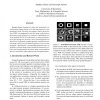2045 search results - page 51 / 409 » Learning programming with Erlang |
124
Voted
CEC
2010
IEEE
15 years 11 days ago
2010
IEEE
The great majority of genetic programming (GP) algorithms that deal with the classification problem follow a supervised approach, i.e., they consider that all fitness cases availab...
108
Voted
ITCC
2003
IEEE
15 years 7 months ago
2003
IEEE
The goal of this paper is to describe a new approach to a content creation and delivery mechanism for a programming course. This approach is based on the concept of creating a lar...
107
Voted
CHI
2009
ACM
16 years 2 months ago
2009
ACM
This paper investigates the role of online resources in problem solving. We look specifically at how programmers--an exemplar form of knowledge workers--opportunistically interlea...
105
click to vote
ICCV
2005
IEEE
16 years 4 months ago
2005
IEEE
Example-based learning of codes that statistically encode general image classes is of vital importance for computational vision. Recently, non-negative matrix factorization (NMF) ...
121
click to vote
ICCBR
2003
Springer
15 years 7 months ago
2003
Springer
Abstract. The definition of similarity measures is one of the most crucial aspects when developing case-based applications. In particular, when employing similarity measures that ...

